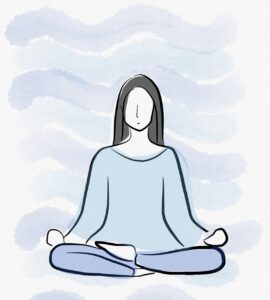Many people are looking for the Meditation practice that best works for them. Regular practice improves your ability to deal with the stressors of life. It also promotes relaxation, mindfulness, and self-awareness and over time allows you to calm your thoughts.
It is helpful to start with a commitment of 15 minutes in the morning and 15 in the evening and just experiment. Observe your experience with curiosity and without judgment. It is not about conducting a perfect practice or reaching an end goal.
There are various types of meditation, each with a distinct focus and method. Here’s an outline of some common meditation practices:
- Mindfulness Meditation:
- Focuses on cultivating present-moment awareness. Can be done anywhere sitting quietly or in daily activities.
- Involves observing thoughts, emotions, and sensations without judgment.
- Often uses the breath as a point of focus.
- Transcendental Meditation:
- Involves repeating a specific mantra silently, and sitting comfortably with the eyes closed.
- Aims to transcend ordinary thought and experience a deep state of restful awareness.
- Typically practiced for 15-20 minutes twice daily.
- Loving-Kindness Meditation (Metta):
- Focuses on cultivating feelings of love and compassion.
- Practitioners send positive thoughts and well-wishes to themselves and others. The phrase “May I be happy. May I be well. May I be safe. May I be peaceful and at ease.” is used with the “I” changed out in subsequent repetitions to direct attention to specific people or communities. The meditation ends with the universal mantra: “May all beings everywhere be happy.”
- Aims to foster a sense of goodwill and connection. It is used to send good wishes to those you love and also those who challenge you.
- Body Scan Meditation:
- Involves mentally scanning and relaxing each part of the body.
- Promotes body awareness and relaxation.
- Often used as a relaxation technique.
- Zen Meditation (Zazen):
- Rooted in Zen Buddhism.
- Emphasizes maintaining a specific posture and focusing on the breath.
- Aims to experience insight and enlightenment.
- Guided Meditation:
- Led by a guide or teacher often using as many senses as possible, such as smell, sounds, and textures.
- Involves verbal instructions and imagery to lead practitioners through a specific experience.
- Common themes include relaxation, visualization, and self-discovery.
- Chakra Meditation:
- Focuses on the body’s energy centers (chakras).
- Practitioners aim to balance and align their chakras through meditation.
- Often involves visualizing and breathing into each chakra. attention may be given to the respective chakra colors and sounds.
- Mantra Meditation:
- Involves repeating a word, phrase, or sound (mantra).
- Aims to quiet the mind and induce a meditative state.
- Examples include chanting “Om” or a specific word.
- Breath Awareness Meditation:
- Centers on mindful observation of the breath.
- Focuses on inhalation and exhalation, bringing attention to the breath’s natural rhythm.
- Enhances concentration and mindfulness.
- Walking Meditation:
- Involves walking slowly and mindfully.
- Focuses on the sensations of walking and the surrounding environment.
- Combines physical activity with meditative awareness.
- Vipassana Meditation:
- Traditional Buddhist meditation.
- Involves observing bodily sensations to develop insight into the nature of reality.
- Practiced in silent retreats – often taught during a 10-day course, where practitioners abstain from all intoxicants, and refrain from telling lies, stealing, sexual activity, and killing any species.
Many people combine elements from different practices to suit their preferences and goals. Or, you may find that different techniques work best for you at different times. Happy Meditating.
